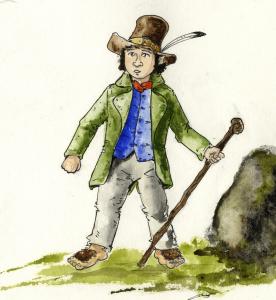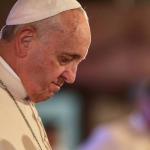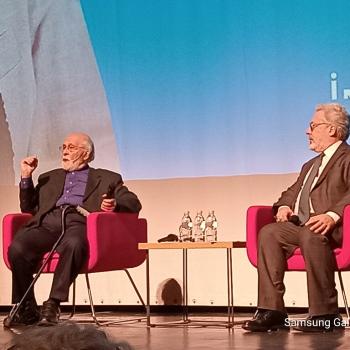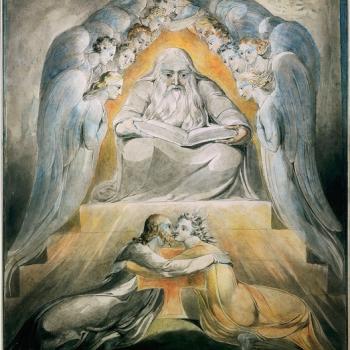 In The Lord of the Rings, Tolkien, with his mythopoetic style, created a world filled with different races and cultures which had histories of their own, pitting them in conflict with each other. Each race, each nation, each culture could list valid grievances against each other; the Elves and the Dwarves certainly had a long history of distrust and dislike which would otherwise seem unsurmountable. And yet, when Sauron was revealed once again active in Middle Earth, they were able to come together, put aside their differences, and work for the common good. Wisdom not only demonstrated that the Ring had to be destroyed, but also, the conflicts which separated and divided the peoples of Middle Earth had to be overcome so that they could work together to bring about the downfall of Sauron. Thus, after Frodo had indicated he would take the Ring to Mordor, Elrond made sure he would have suitable companions to help him with his task, companions representing the different peoples of Middle Earth:
In The Lord of the Rings, Tolkien, with his mythopoetic style, created a world filled with different races and cultures which had histories of their own, pitting them in conflict with each other. Each race, each nation, each culture could list valid grievances against each other; the Elves and the Dwarves certainly had a long history of distrust and dislike which would otherwise seem unsurmountable. And yet, when Sauron was revealed once again active in Middle Earth, they were able to come together, put aside their differences, and work for the common good. Wisdom not only demonstrated that the Ring had to be destroyed, but also, the conflicts which separated and divided the peoples of Middle Earth had to be overcome so that they could work together to bring about the downfall of Sauron. Thus, after Frodo had indicated he would take the Ring to Mordor, Elrond made sure he would have suitable companions to help him with his task, companions representing the different peoples of Middle Earth:
‘And I will choose you companions to go with you, as far as they will or fortune allows. The number must be few, since your hope is in speed and secrecy. Had I a host of Elves in armour of the Elder Days, it would avail little, save to arouse the power of Mordor.
‘The Company of the Ring shall be Nine; and the Nine Walkers shall be set against the Nine Riders that are evil. With you and your faithful servant, Gandalf will go; for this shall be his great task, and maybe the end of his labours.
‘For the rest, they shall represent the other Free Peoples of the World: Elves, Dwarves, and Men. Legolas shall be for the Elves; and Gimli son of Glóin for the Dwarves. They are willing to go at least to the passes of the Mountains, and maybe beyond. For men you shall have Aragorn son of Arathorn, for the Ring of Isildur concerns him closely.’[1]
Evil divides, while the common good unites. The Ring, itself a force of evil, often found its way to cause division even within the Fellowship, which can be seen especially with the fate of Boromir indicated, and yet even in the midst of such evil, something good can come about and heal what is wounded, as also the repentance and end of Boromir also indicated. What divides, what destroys the common good, what causes strife and conflict, can be and must be dealt with; but it must be dealt with in the right way, with respect for the common good. The common good is real, and it must be, in its nature, pluralistic, allowing for diversity. When some are unable to find their place within the common good, the common good is itself undermined.
This is one of the many lessons which can be found in The Lord of the Rings. The common good requires a pluralistic approach; the little people of the world, those who seem small and insignificant, represented by the Hobbits, have a task equal to or even greater than those who otherwise seem to be influential and important in the affairs of the world. Diversity brings strength, so long as the diversity is brought together for the common good. The rich must give way to the poor as the poor inherits the earth so that they can enjoy the good of the earth with the poor.
The scandal of the incarnation is itself a pluralistic scandal. In the body of Christ, there is a diversity of persons. “For just as the body is one and has many members, and all the members of the body, though many, are one body, so it is with Christ. For by one Spirit we were all baptized into one body — Jews or Greeks, slaves or free — and all were made to drink of one Spirit” (1Cor. 12:12-13 RSV). Salvation might be from the Jews, but it is opened up to all – all are to come together and share their gifts with each other, helping each other, serving each other in love, overriding the division established by sin. “There is neither Jew nor Greek, there is neither slave nor free, there is neither male nor female; for you are all one in Christ Jesus” (Gal. 3:28 RSV). And yet, in that unity, there comes a new diversity; people do not find themselves being absorbed into the body of Christ with their personal differences are undermined. In Christ, they should discern that they are called to serve each other, not lording it over each other because they believe their unique qualities make them superior to everyone else:
As it is, there are many parts, yet one body. The eye cannot say to the hand, “I have no need of you,” nor again the head to the feet, “I have no need of you.” On the contrary, the parts of the body which seem to be weaker are indispensable, and those parts of the body which we think less honorable we invest with the greater honor, and our unpresentable parts are treated with greater modesty, which our more presentable parts do not require. But God has so composed the body, giving the greater honor to the inferior part, that there may be no discord in the body, but that the members may have the same care for one another. (1Cor. 12:20-25 RSV),
Understanding, therefore, that conflict due to division in the world is the result of sin, the Christian is to seek to bring a harmonious unity to the different peoples and cultures in Christ, working to serve and help each other with their unique gifts. Those who were seen as less and inferior turn out to be the very ones who should be promoted just as those who thought themselves to be great because of their place in divided humanity will find their greatness was a result of sin and is going to be undermined before they find their true place in the better harmony of Christ:
And he lifted up his eyes on his disciples, and said: “Blessed are you poor, for yours is the kingdom of God. “Blessed are you that hunger now, for you shall be satisfied. “Blessed are you that weep now, for you shall laugh. “Blessed are you when men hate you, and when they exclude you and revile you, and cast out your name as evil, on account of the Son of man! Rejoice in that day, and leap for joy, for behold, your reward is great in heaven; for so their fathers did to the prophets.
“But woe to you that are rich, for you have received your consolation. “Woe to you that are full now, for you shall hunger. “Woe to you that laugh now, for you shall mourn and weep. “Woe to you, when all men speak well of you, for so their fathers did to the false prophets” (Lk. 6:20-26 RSV).
Those who benefit from sin will suffer as a result of their sin; they get the reward of sin. However, this does not have to be their end. They are called to penance, to join in with the little people, to work together and overcome the division and hostility which they thrive upon, so that the common good can be established. In the Lord of the Rings, this is established by the way the Hobbits, the lowly people of the Shire, are aided by the great heroes of their time; the disharmony which divided Elf, Dwarf and Man from each other was overcome by the little people, the poor in spirit, so that in wisdom, new friendships were formed which allowed them to overcome the power of darkness, the One Ring which would divide them all. Tolkien certainly understood the positive value of pluralism in society, even as he understood the evils of racism and the conflicts which arose from racist ideologies (as can be seen in the treatment of humanity by the Elves), but he also understood the common good and the good which is established in a unified diversity.
Pluralism is at the heart of the Christian message; the early disciples had to learn this as their prejudices against Samaritans and Gentiles gave way to the church’s universal scope. The way to destroy the ring, the power of evil which divides people against each other, is the same as it is in the Lord of the Rings. The little people, the people poor in spirit but big in faith, must be aided by the rest of society; then together they must journey to where the ring was constructed, that is, to the causes which establish the social structures of evil in society, and overturn them together. Where there is hatred and injustice, love and justice must prevail. The roots of the evil must be overturned with the humble leading the way. Pluralism is not against the Gospel, it is the fruit of the Gospel. The evil of Babel is overturned by the Spirit of Life, as the church comes together, united under the humblest of all, the Lord Jesus Christ, who emptied himself of all so that he can reign over all with love.
[Image=A Hobbit by Antoine Glédel [CC BY-SA 3.0 (https://creativecommons.org/licenses/by-sa/3.0)], from Wikimedia Commons[
[1] J.R.R. Tolkien, The Fellowship of the Ring (Boston: Houghton Mifflin, 1954; rpr. 1994), 268.
Stay in touch! Like A Little Bit of Nothing on Facebook













